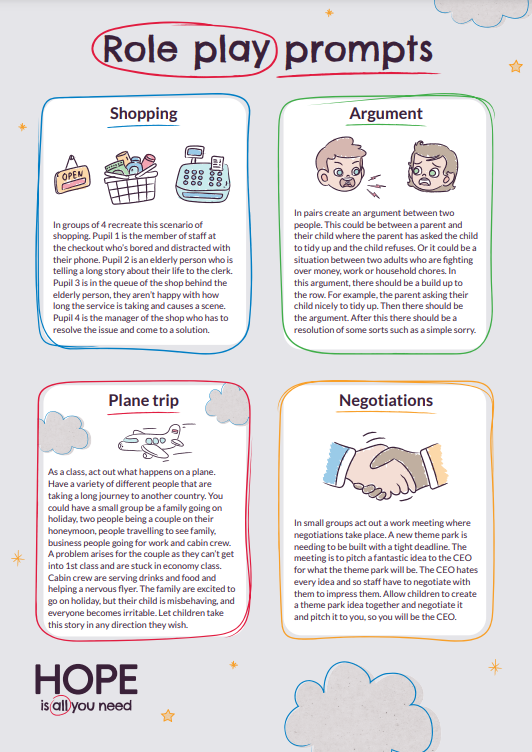Using drama in the classroom
Drama allows children to delve into topics in a fun and creative way. Using drama in the classroom is essential to develop numerous key skills in children, especially social skills. Drama lets children explore their feelings and themselves as well as others.
There are plenty of ways to introduce drama into the classroom, and to assist you we have created a list of activities to do with your pupils. We also have a free role play card resource to use in lessons.
Why drama?
Drama is essential as it gives children opportunities to explore, discuss and deal with difficult real-life issues. It also opens knowledge of their own cultural values and other people cultures too.
Drama is an opportunity for children to think and act creatively that helps to develop their critical thinking skills and problem-solving skills. These are skills needed in pupil’s futures as they prepare them for their working lives. Incorporating drama in the classroom encourages pupils to take on responsible roles and forces them to choose. These areas help prepare them for their futures and life right now as it reflects the real world where decisions need to be made.
Drama activities for kids
There are plenty of opportunities to incorporate drama into the classroom. We have listed some drama activities for kids that you can try out with your pupils.
Yes let’s
This classic game is a must do activity for children to explore drama and develop vital skills. The game is simple and allows children to work together and socialise. You could start the game off my shouting out let’s and then suggest an activity. Whatever the activity is pupils must say yes lets and then act it out. For example, you could say let’s cook a meal and then the children will say back yes let’s and together act out cooking a meal. Allow each pupil to suggest what to do next too.
Wink murder
A great way to incorporate drama into your lessons is through the fun game of wink murder. It’s a fantastic and enjoyable icebreaker to lead into other drama activities. Select a pupil to be the detective and ask them to leave the room. Between the rest of the pupils, decide together on who will be the murderer.
Once decided, let the detective back in the room to stand in the middle of a circle. The selected person will begin winking to other children across the circle and the children can act out in any way they would like to fall onto the ground. The detective must suss out who is the murderer before everyone is on the ground.
This game allows children to have a bit of fun and be as silly as they like with drama. They can use their creativity to think of different ways to drop to the floor.
Charades
This classic drama activity is perfect for using drama in the classroom. Let children act out different story or film characters or their favourite parts of a story/film. The others need to guess by the acting, the person who guesses correctly acts out a charade themselves.
To ensure that every pupil is benefitting from this activity, group them up to do a group charade. Doing this also lets pupils socialise with each other more and make new friendships too.
You can even use our charades for kids’ game to assist them with their ideas for the activity. This can help build language skills as well as bringing a fun drama session.

Be an expert
Give out scenarios and topics to small groups or let pupils decide on it. In the groups let children take turns to be the expert on this topic and tell the others all about it. They must carry themselves with confidence and sound authoritative to show that they know a lot about it even if they don’t. This task uses drama through tone of voice as pupils will need to change their tone. It also shows children how to be confident in their ideas and act confident which will help them in their futures. Plus, it can use their imaginations if they don’t know a lot about the chosen topic as they will have to make it up.
Act stories out
Include drama into your English lessons by getting your class to act out stories that you may be reading together. This is a great activity to do with your guided reading sessions. Let children choose what characters they want to be, being on hand if there’s any clashes to prevent fallouts. You can do this as a whole class or in small groups where they can practice their piece and act it to the rest of the class.
To make it extra fun why not get some costumes and props to bring their story characters to life?
Zip zap zoom
A classic icebreaker to get children in the mood for acting zip, zap, zoom is perfect to lead into other drama activities. This game lets children be comfortable with one another and gets the socialising. They can play on sounds with this game and be silly which they will enjoy. Your class should stand in a circle and choose to either zip to the person next to them (clockwise), zap across the circle or zoom (anticlockwise). You can even add a boing to reflect the zip, zaps or zooms and bounce it back to the person that directed it at you.
Play with voices
Let children play with different voices by giving them scenarios, situations or our role play card resource below. Get them to act it out and tell them to use different voices throughout the performance. This helps with building language skills whilst having lots of fun and laughs. Let your pupils take this in any direction they want and to ensure that they change voices, you can shout change. When this is shouted each pupil must change their voice.
If any pupil struggles with new voice ideas, help them out by giving them ideas or showing them examples. They will appreciate you joining in plus it can bring more fun as they see you be a little silly.
Use our free role play card resource to act scenarios out
Our downloadable role play resource has 4 scenarios that your class can act out. Use it in your lesson as an activity to help children use their imagination. Split the class into groups and have them act out one of the scenarios. You can have different groups acting out different scenarios and they can perform them at the end of the lesson to the class. Encourage imagination and improv too.
Using drama in the classroom can really help pupils explore their imagination and express their feelings. Use these activities to develop children’s key social skills and have them enjoy drama in the classroom. What other scenarios can your class come up with?
